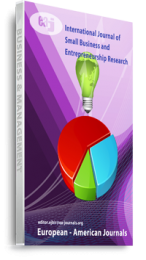The study adopted survey method with a target population of 4963 entrepreneur-farmers. The sample size of 370 was determined using Yamane (1967) formula (Eboh, 2009).Applying Bowley’s proportional allocation statistical technique, the sample size for each category of respondents was estimated. The systematic linear random sampling technique was applied to select the 370 respondents. Primary and secondary sources of data were accessed. The primary data were collected through the researcher’s self-designed questionnaire titled “Entrepreneur Self-Assessment Questionnaire(ESAQ)”.In the questionnaire, the five point Likert Scale was used to measure the agreeableness of the entrepreneurs on the subject, where Strongly Agree(SA),Agree(A),Neutral(N), Disagree(D),Strongly Disagree(SD) denote the values, 5,4,3,2,1 respectively. In-depth interviews were held with entrepreneur-farmers. Pilot survey was conducted. The instrument was validated by experts’ opinions. Using Cronbach’s Alpha technique, the reliability coefficient of 0.988 was determined, reflecting high degree of internal consistency of the research instrument. One hypothesis and a research question guided the study. At 0.05 level of significance and 15 degrees of freedom, the hypothesis was tested using one way ANOVA technique and Minitab software package. The study revealed that the extent of entrepreneur perception at 89.40 percent had significant positive effects on the growth of beekeeping in Abia State of Nigeria. Recommendations were made
Keywords: Bee products, Beekeeping, Bees, Entrepreneur, Perception, Venom and Toxin

